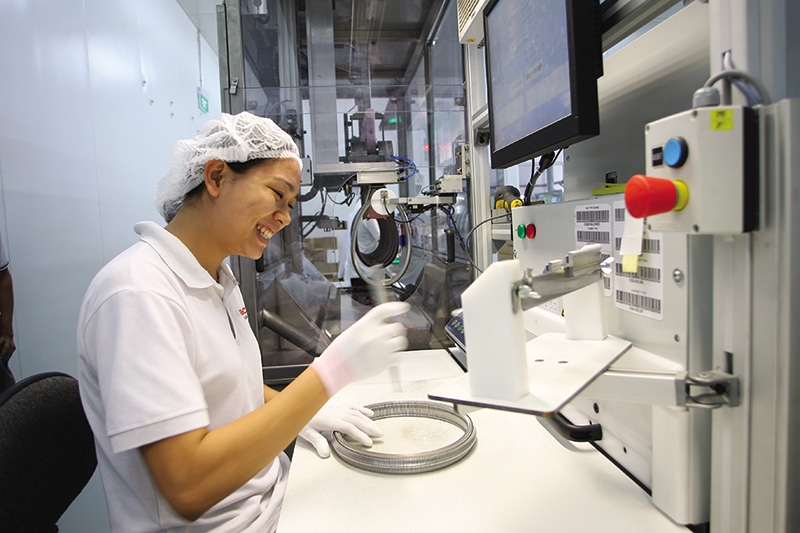New rules governing protection
 |
| The EVFTA and EVIPA are a game-changer, but stakeholders need to update on the new rules to take advantage |
The EU-Vietnam Free Trade Agreement (EVFTA) was split into two separate agreements in June 2018, one on trade and one on investment. The EVFTA needs to be ratified by the European Commission and European Parliament, while the EU-Vietnam Investment Protection Agreement (EVIPA) must be additionally ratified by the parliament of each EU member state.
 |
| Dr Oliver Massmann |
The deals, signed in Hanoi on June 30 after nine years of negotiations, are the first comprehensive and ambitious trade and investment agreement that the EU has ever concluded with a developing country in Asia, and the second agreement in the Southeast Asian region after Singapore. It aims to intensify bilateral relations between Vietnam and the EU.
The EU has agreed to eliminate duties for 84 per cent of the tariff lines for goods imported from Vietnam immediately at the entry into force of the FTA. Within seven years from the effective date of the agreement, more than 99 per cent of the tariff lines will have been eliminated for the country.
Vietnam will benefit more from the EVFTA compared with other FTAs since the country, and the EU are considered to be two supporting and complementary markets: Vietnam exports goods that the EU cannot or does not produce itself (for example fishery products and tropical fruits) while the products imported from the EU are also those that Vietnam cannot produce domestically.
Vietnam has one of the highest ratios of public investment-to-GDP in the world (39 per cent annually from 1995). However, until now, Vietnam has not agreed to its government procurement being covered by the Government Procurement Agreement (GPA) of the World Trade Organization (WTO). Now, for the first time, Vietnam has undertaken to do so in the EVFTA.
The FTA commitments on government procurement mainly deal with the requirement to treat EU bidders, or domestic bidders with EU investment capital, equally with Vietnamese bidders when a government purchases goods or requests a service worth over the specified threshold.
Vietnam undertakes to publish information on tenders in a timely manner, allow sufficient time for bidders to prepare for and submit bids, and maintain the confidentiality of tenders.
The FTA also requires its parties to assess bids based on fair and objective principles, evaluate and award bids only based on criteria set out in notices and tender documentation, and create an effective regime for complaints and settling disputes, among other things. These rules require parties to ensure that their bidding procedures match the commitments and protect their own interests, thus helping Vietnam to solve its problem of bids being won by cheap but low-quality service providers.
Enhanced dispute settlement
Investor dispute settlement is now covered in the EVIPA. The term “investment” under the EVIPA is limited to kinds of assets that are owned or controlled, directly or indirectly, by an investor of the EU or Vietnam in the territory of Vietnam or the EU; and have the characteristics of an investment – for example, commitment of capital or other resources, the expectation of gain or profit, or the assumption of risk and a certain duration.
In disputes regarding the investment, an investor is allowed to take them to the investment tribunal for settlement. This means that the investors do not need to lobby their governments to file the case on their behalf. To ensure fairness and independence of the arbitration court, a permanent international investment tribunal will be formed with nine members, which consists of three nationals appointed from each of the EU bloc and Vietnam; and three nationals appointed from third countries.
Cases will be heard by a three-member tribunal selected by the chairman of the tribunal, seeking to ensure consistent rulings in similar cases, thus making the dispute settlement more predictable. The EVIPA also allows a sole tribunal member where the claimant is a small- or medium-sized enterprise, or if the compensation of damaged claims is relatively low. This is a flexible approach considering that Vietnam is still a developing country.
In case either disputing parties disagree with the decision of the tribunal, they can approach the appeals tribunal. While this is different from common arbitration proceedings, it is quite similar to the two-level dispute settlement mechanism in the WTO Appellate Body. We believe that this mechanism can save time and cost for proceedings.
The final settlement is binding and enforceable without question from the local courts regarding its validity, except for a five-year period following the entry into force of the FTA for Vietnam. However, it has to be noted that the investor dispute settlement mechanism does not automatically apply in all disputes regarding investment covered under the EVIPA.
In fact, parties to disputes can agree to solve them by other means, for example, international commercial arbitration, local courts, action in the framework of the WTO, or any action under other international agreements which both the EU and Vietnam are party to. It is important that parties choose the correct forum to maximise the chances of winning their case.
What the stars mean:
★ Poor ★ ★ Promising ★★★ Good ★★★★ Very good ★★★★★ Exceptional
Themes: EVFTA & EVIPA
Related Contents
Latest News
More News
- Hermes joins Long Thanh cargo terminal development (February 04, 2026 | 15:59)
- SCG enhances production and distribution in Vietnam (February 04, 2026 | 08:00)
- UNIVACCO strengthens Asia expansion with Vietnam facility (February 03, 2026 | 08:00)
- Cai Mep Ha Port project wins approval with $1.95bn investment (February 02, 2026 | 16:17)
- Repositioning Vietnam in Asia’s manufacturing race (February 02, 2026 | 16:00)
- Manufacturing growth remains solid in early 2026 (February 02, 2026 | 15:28)
- Navigating venture capital trends across the continent (February 02, 2026 | 14:00)
- Motivations to achieve high growth (February 02, 2026 | 11:00)
- Capacity and regulations among British areas of expertise in IFCs (February 02, 2026 | 09:09)
- Transition underway in German investment across Vietnam (February 02, 2026 | 08:00)

 Tag:
Tag:




















 Mobile Version
Mobile Version